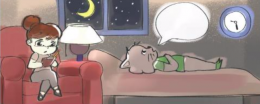
The Binghamton University Counseling Center recently announced its partnership with ProtoCall to provide after-hours phone services to students who need support when the Center is closed. According to the Center’s website, the services will be available on nights and weekends, and the call center is staffed by master’s- or doctoral-level mental health professionals.
While the Editorial Board supports and commends the Center for addressing this issue of a shortage of counselors and extending its offerings to account for the time when it’s not open to students, this is only the first step in a long list of improvements in service that should be made.
Although this is a positive change, we still must pay attention to its drawbacks. The term “after-hours” in itself must be evaluated; the hours that this service will be available, which are from 5 p.m. to 8:30 a.m. on weekdays, are not truly after- hours for students. The Center is open from 9 a.m. to 5 p.m. Monday through Friday, and although these are regular business hours, they are not necessarily the same hours during which students function — or during which they are able to seek additional support.
Most students at BU, especially underclassmen, have class five days a week with few breaks in between that would be long enough to schedule an appointment with a counselor. A significant number of students are available beginning at around 5 p.m. every day, which is when the Center closes for the day. The extra services are certainly needed, but the question must be raised of how effective over-the-phone counseling will be for students in need of support.
The ProtoCall call centers are located across the United States in Oregon, Michigan and New Mexico. The Center says that the counselors will be familiar with BU’s resources in order to provide the best course of action, but we question how effective this will be. It seems likely that the counselors will simply look up the University in a database of hundreds of colleges and determine from there what the best course of action will be. Since the counselors work remotely, they are not truly familiar with specific issues BU students might be facing.
Moreover, the Editorial Board is concerned about the Center’s shortcomings overall. Students who should need more than a few counseling appointments are often referred off campus, which can be a major challenge in itself. Many people don’t have adequate transportation or time to keep up with counseling off campus. Plus, cost is a huge burden to many students seeking mental health services. On-campus services are free, but most off-campus ones are not.
Additionally, it seems as though half the battle of going to the Center is getting an appointment past the first week of the semester. Countless students are placed on a waiting list, and even if they get a first appointment, it’s merely a consultation to determine whether or not they should continue seeing someone on campus. There is no guarantee that the Center will contact them again with an available counselor during that semester. This can be highly discouraging for students who have worked hard to seek in-person help — something that can be grueling in itself.
After considering models used by other colleges and universities across the country, we suggest spreading our counselors around campus at different hours to make them more accessible to students on and off campus. Perhaps there should be one or two designated counselors that serve each residential community with walk-in hours on weeknights. Additionally, it would be beneficial for students who live off campus to have counselors available at the University Downtown Center. This need can potentially be filled with master’s of social work students who need to fulfill clinical hours.
The Center should not stop here with its improvements. The University must prioritize students’ mental health with overall health.


